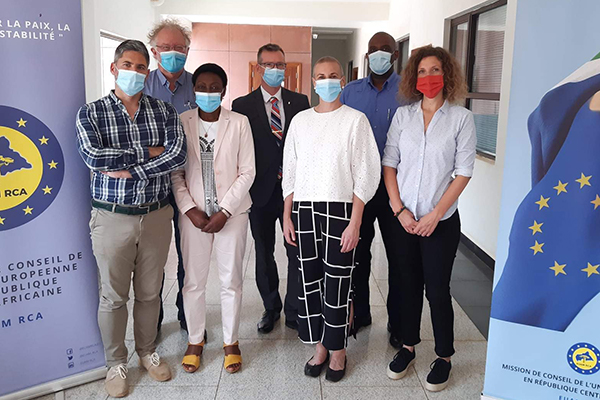Caroline Gårdestedt's field story from the Central African Republic
The Central African Republic (CAR) is one of the least-developed countries in the world. Recurring violence, persistent shocks and degradation of basic services continues to worsen the living conditions of the population. In December 2019, at the request of the CAR government, the European Union established a civilian advisory mission which is deployed to Bangui since July 2020.

During a visit from the Swedish Prison and Probation Service in November 2021, Ms. Caroline Gårdestedt on the far right of the picture. The Swedish Prison and Probation Service is seconding a Strategic Advisor to the EU advisory mission to support the Penitentiary Administration in CAR.
The EU advisory mission’s mandate in the Central African Republic is to provide strategic advice to the Ministry of Interior, Internal Security Forces, police, and gendarmerie in an effort to support security sector reform in the country and improving the security of the population. MSB is supporting the mission with Ms. Caroline Gårdestedt as the first Environmental Advisor in EU civilian crisis management operations.
– The environmental advisor role is new in EU CSDP missions which comes with both a wide variety of expectations and curiosity, as well as opportunities to be part of shaping what the role should be about, Ms. Caroline Gårdestedt says.
The high level of poverty and low degree of development in CAR limits the capacity of people and communities to manage climate risk and increasing their vulnerability to climate related shocks. The objective of the environmental advisor role in the EU advisory mission is to assist the operational team to integrate environmental and climate considerations in the implementation of the mission’s mandate. The focus in the coming months will be on collaboration with colleagues supporting the local Penitentiary Administration, the police and gendarmerie as well as the Ministry of water and forests. Another part of the work is to start measuring the environmental footprint of the mission and develop a strategy to reduce the footprint. Within the remit of the role is also the analysis of the links between security, climate and environment in the CAR context and potential implications on the mission’s mandate.
– It is the second time that I am working in CAR. I was based here 11 years ago working for a humanitarian organisation. CAR and the people in this country had a profound effect on me and I am glad that I got this opportunity to come back. It will take time, but I strongly believe that we can contribute to make a difference for the people in CAR with the work that we are doing, Ms. Caroline Gårdestedt says.
People’s resilience is eroding under the burden of successive crisis and economic decline forcing nearly the entire population to adopt negative coping mechanisms. Humanitarian needs are reaching levels not seen since 2015 due to new conflict dynamics observed since December 2020. In 2022, it is estimated that 3.1 million people in CAR, 63% of the country’s total population, will need humanitarian assistance and protection.
